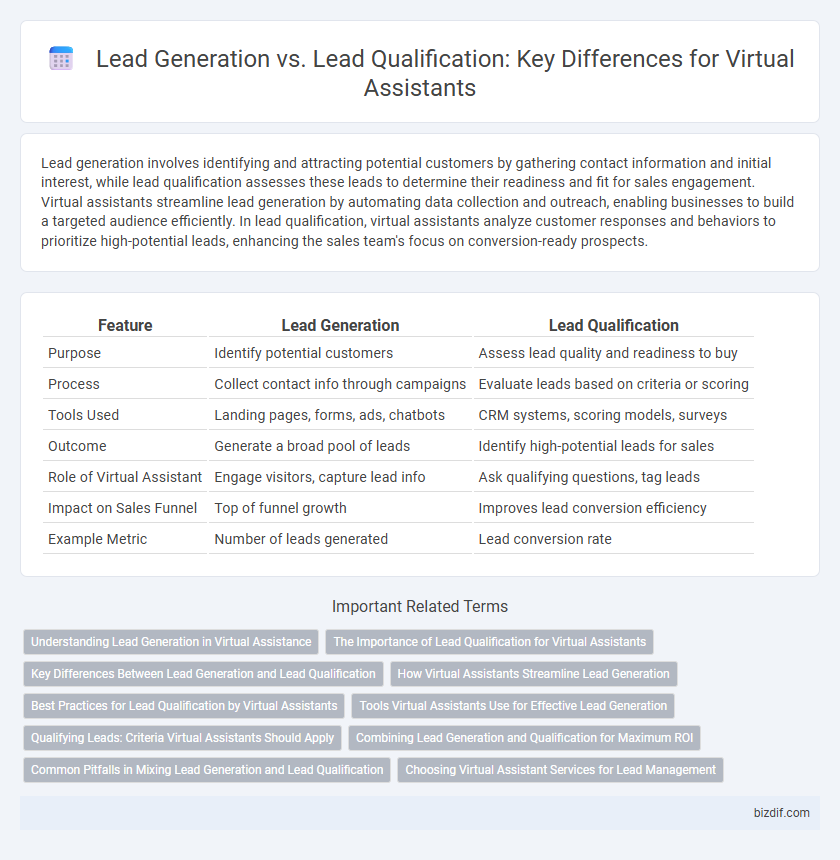Lead generation involves identifying and attracting potential customers by gathering contact information and initial interest, while lead qualification assesses these leads to determine their readiness and fit for sales engagement. Virtual assistants streamline lead generation by automating data collection and outreach, enabling businesses to build a targeted audience efficiently. In lead qualification, virtual assistants analyze customer responses and behaviors to prioritize high-potential leads, enhancing the sales team's focus on conversion-ready prospects.
Table of Comparison
| Feature | Lead Generation | Lead Qualification |
|---|---|---|
| Purpose | Identify potential customers | Assess lead quality and readiness to buy |
| Process | Collect contact info through campaigns | Evaluate leads based on criteria or scoring |
| Tools Used | Landing pages, forms, ads, chatbots | CRM systems, scoring models, surveys |
| Outcome | Generate a broad pool of leads | Identify high-potential leads for sales |
| Role of Virtual Assistant | Engage visitors, capture lead info | Ask qualifying questions, tag leads |
| Impact on Sales Funnel | Top of funnel growth | Improves lead conversion efficiency |
| Example Metric | Number of leads generated | Lead conversion rate |
Understanding Lead Generation in Virtual Assistance
Lead generation in virtual assistance involves identifying potential customers by leveraging digital tools and data analysis to gather contact information and gauge initial interest. Efficient lead generation focuses on targeting the right audience through social media platforms, email marketing, and CRM software to build a robust pipeline of prospects. This process lays the foundation for subsequent lead qualification, where leads are assessed for their readiness to convert, ensuring sales efforts are focused on high-potential opportunities.
The Importance of Lead Qualification for Virtual Assistants
Lead qualification is essential for virtual assistants to streamline the sales process and increase conversion rates by identifying high-potential prospects from a large pool of leads. Efficient lead qualification saves time and resources by prioritizing contacts that align with specific buyer personas and readiness levels, enhancing targeted communication and nurturing. Integrating advanced CRM tools and AI-driven data analysis further empowers virtual assistants to assess lead quality accurately and drive meaningful engagement.
Key Differences Between Lead Generation and Lead Qualification
Lead generation involves attracting and capturing potential customer information through marketing efforts such as content marketing, social media campaigns, and paid ads, aiming to build a broad database of prospects. Lead qualification, on the other hand, assesses these prospects based on criteria like budget, authority, need, and timeline (BANT), determining which leads are most likely to convert into sales opportunities. The key difference lies in lead generation focusing on volume and acquisition, while lead qualification emphasizes quality and prioritization for sales engagement.
How Virtual Assistants Streamline Lead Generation
Virtual assistants streamline lead generation by automating data collection and initial outreach, enabling businesses to capture a higher volume of potential leads efficiently. They use AI-driven tools to identify and engage prospects based on predefined criteria, improving lead quality before handoff to sales teams. This automation reduces manual workload and accelerates the sales pipeline, maximizing conversion opportunities.
Best Practices for Lead Qualification by Virtual Assistants
Virtual assistants enhance lead qualification by employing data-driven criteria to filter prospects, ensuring higher conversion rates and efficient sales funnel management. Best practices include leveraging CRM integration, personalized communication, and real-time data analysis to accurately assess lead potential. Automating follow-ups and maintaining detailed lead scoring models optimize the qualification process and prioritize high-value leads effectively.
Tools Virtual Assistants Use for Effective Lead Generation
Virtual assistants leverage CRM platforms, email marketing software, and AI-powered chatbots to enhance lead generation by automating data collection and initial customer interactions. Tools like HubSpot and Salesforce enable efficient lead capture and segmentation, while AI-driven analytics help identify high-potential prospects for targeted follow-up. Integration of multi-channel communication tools streamlines outreach efforts, maximizing lead volume and quality before advancing to lead qualification stages.
Qualifying Leads: Criteria Virtual Assistants Should Apply
Qualifying leads involves assessing potential customers based on criteria such as budget, authority, need, and timeline (BANT) to ensure they are a good fit for the product or service. Virtual assistants should apply these criteria to prioritize leads that show genuine interest and readiness to buy, optimizing sales efforts and improving conversion rates. Using CRM tools, virtual assistants can track lead behavior and engagement, enhancing the accuracy of qualification and streamlining the sales pipeline.
Combining Lead Generation and Qualification for Maximum ROI
Combining lead generation and lead qualification enhances overall marketing efficiency by attracting high-potential prospects while filtering out unqualified leads early in the sales funnel. Integrating automated virtual assistant tools streamlines data collection and qualification criteria, improving conversion rates and reducing customer acquisition costs. This synergistic approach maximizes ROI by focusing resources on leads most likely to convert, accelerating sales cycles and boosting revenue growth.
Common Pitfalls in Mixing Lead Generation and Lead Qualification
Confusing lead generation with lead qualification often results in poor sales funnel management, as unqualified leads consume valuable resources and lower conversion rates. Many businesses mistakenly treat all leads as qualified prospects, missing key behaviors and criteria that indicate genuine interest. Efficient virtual assistants use distinct processes and AI-powered tools to separate lead acquisition from lead evaluation, optimizing marketing ROI and improving pipeline accuracy.
Choosing Virtual Assistant Services for Lead Management
Lead generation focuses on attracting potential customers by identifying and engaging prospects through virtual assistant services specialized in outreach and data collection. Lead qualification involves assessing and prioritizing these prospects based on predefined criteria to ensure efficient sales efforts, a task virtual assistants perform by analyzing responses and updating CRM systems. Choosing virtual assistant services that integrate both lead generation and lead qualification enhances lead management by streamlining workflows and improving conversion rates.
Lead generation vs Lead qualification Infographic

 bizdif.com
bizdif.com